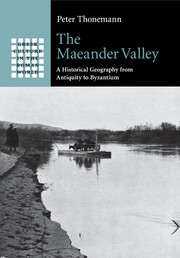Book contents
- Frontmatter
- Contents
- Maps and Figures
- Preface
- Acknowledgements
- Abbreviations
- Map 1 The Maeander valley
- 1 The valley
- 2 Hydrographic heroes
- 3 The nature of Roman Apamea
- 4 The fortress at Eumenea
- 5 The pastoral economy
- 6 The nobility of Mt Cadmus
- 7 The rural economy
- 8 The bounty of the Maeander
- Epilogue The historical geography of the Maeander valley
- Bibliography
- Index
5 - The pastoral economy
Published online by Cambridge University Press: 07 October 2011
- Frontmatter
- Contents
- Maps and Figures
- Preface
- Acknowledgements
- Abbreviations
- Map 1 The Maeander valley
- 1 The valley
- 2 Hydrographic heroes
- 3 The nature of Roman Apamea
- 4 The fortress at Eumenea
- 5 The pastoral economy
- 6 The nobility of Mt Cadmus
- 7 The rural economy
- 8 The bounty of the Maeander
- Epilogue The historical geography of the Maeander valley
- Bibliography
- Index
Summary
The monastery of Boreine
Early one morning in the last years of the twelfth century ad, a Philadelphian craftsman by the name of Gregory set out on his regular climb into the hills south-west of the city, along with his apprentices, to collect charcoal for fuel. A few hundred yards above the southern walls of Philadelphia, Gregory crossed over the the great imperial highway, running south-east along the foot of Mt Kissos towards the border towns of Tripolis and Laodicea. A little above the highway, still within sight of the city, something in the geography of the place made Gregory pause: a flattened place, perhaps a natural terrace of some kind, ideally situated for a vineyard. On the spot, Gregory vowed that if God would allow him to plant his vineyard here, he would build a chapel to the Theotokos with his own hands. A stretch of woodland was duly cleared, and the vineyard planted. Gregory was still a young man, with a wife and a baby daughter; a son, Maximus, was born soon afterwards. His wife and daughter died young. Leaving his baby son to be nursed by his grandmother, Gregory ascended again into the mountain, and built his chapel, a place to retreat into the wilderness and the past. Soon, other members of Gregory's family followed: his father, both brothers and, in time, his son Maximus. A generation passed, and under Maximus’ careful financial management the little oratory had grown into the large and wealthy monastery of Boreine, home to up to twenty monks. In 1247, Maximus, approaching old age, drew up a testament, providing a brief history of the foundation, and laying down regulations for the conduct of the monks. A later copy of this testament, dating a little after 1258, with an updated register of the now very substantial real property of the monastic foundation, is today preserved in the archive of the Vatopedi monastery on Mt Athos.
- Type
- Chapter
- Information
- The Maeander ValleyA Historical Geography from Antiquity to Byzantium, pp. 178 - 202Publisher: Cambridge University PressPrint publication year: 2011



